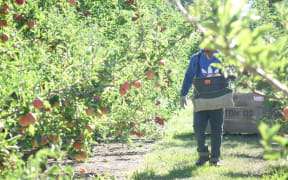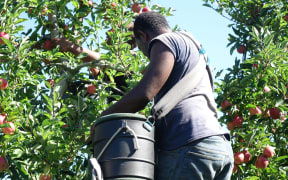The Immigration Minister has announced changes which he says will better support seasonal workers stranded in New Zealand due to Covid-19.

Ian Lees-Galloway said the change will allow migrant seasonal workers to have more flexible hours and roles. Photo: RNZ / Yvette McCullough
Each year up to 14,400 workers, mostly from from Pacific Island nations, arrive in New Zealand to fill labour shortages on orchards and vineyards.
Ian Lees-Galloway said despite work on orchards and vineyards drying up, there were thousands of stranded RSE (Recognised Seasonal Employment) workers who could not get flights home and had no work to support themselves financially.
Lees-Galloway said the Recognised Seasonal Employer worker visas limited people to specific jobs, but changes announced today would allow stranded workers more flexible hours and ease limitations on the roles they could do.
"The RSE scheme is part of our special relationship with the Pacific. As a country, we have a responsibility to support these workers and their employers, whose pastoral care responsibilities include accommodation for the workers," he said.
Horticulture New Zealand said while it welcomed increased flexibility for workers waiting for repatriation back to the Pacific, the decisions should have come a lot earlier.
Chief executive Mike Chapman said the government's delays had caused RSE workers and their employers unnecessary anxiety and cost.
"Immigration New Zealand is now providing the RSE workers who are still in New Zealand with the flexibility to move around the country to take up other horticulture jobs as well as jobs in other industries," Chapman said.
"Today's decisions also mean that the RSE workers who have been stranded here won't have the extra time they have spent in the country count against them, when they return to New Zealand next season."
Changes to RSE scheme cap for next season
Lees-Galloway said with New Zealand facing a rise in unemployment due to Covid-19, he expected more New Zealanders to be available for work on orchards and vineyards next season.
He said for that reason the government had decided to keep the RSE scheme annual cap at 14,400 for the next year. This is not what had been originally announced and planned, he said.
"I want to give employers in the horticulture and viticulture industries as much certainty as possible in uncertain times, so I have taken the decision now even though next seasons workers will only be able to enter New Zealand when it is safe to relax border restrictions."
Mike Chapman said Covid-19 was creating a great deal of uncertainty for growers, but the industry group was working to put contingency plans in place for next season, including looking at the possibility of onshore quarantine for RSE workers at employer's facilities.
"It's really important that we have these RSE workers here... at the same time we're increasing our New Zealand workforce as well."




